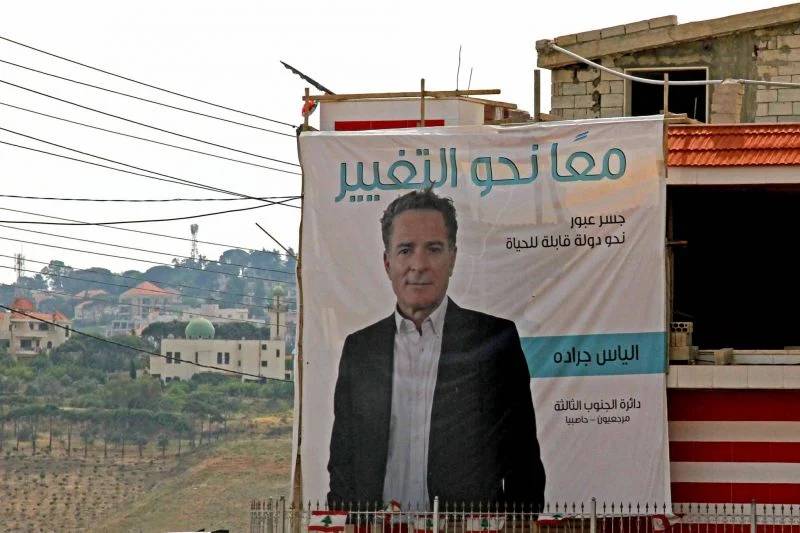
Poster of candidate Elias Jaradi, in southern Lebanon, May 16, 2022. (Photo: Ali DIA / AFP)
The results
Bint Jbeil
Hezbollah and Amal’s Hope and Loyalty list won three Shiite seats in the district, re-electing MPs Hasan Fadlallah and Ayoub Hmayed, who were joined by Ashraf Beydoun.
Marjayoun-Hasbaya
Here too, the Hezbollah-Amal list won the two Shiite seats: Ali Hassan Khalil, who is close to Nabih Berri and indicted in connection with the Aug. 4 Beirut port explosion, as well as Ali Fayyad of Hezbollah. In addition, the two Shiite parties retained the Sunni seat of Qassem Hashem, who is close to the March 8 camp.
The second qualified list in the constituency, Together for Change, close to the Oct. 17 protest movements, snatched the Greek Orthodox seat of Amal-Hezbollah-aligned Syrian Social Nationalist Party (SSNP) MP Asaad Hardan, as well as the Druze seat that AM Bank Chairman Marwan Kheireddine had his eye on. The seats went to Elias Jaradeh and Firas Hamdan respectively.
Nabatieh
In this district, the Hezbollah-Amal list won the three available Shiite seats. Hezbollah MP Mohammad Raad, who headed the list, was re-elected, as was Amal MP Hani Qobeisi. Meanwhile Nasser Jaber, who offered financial support to the list, is new to Parliament this year.
What to expect next
- It is necessary to wait for the final number of preferential votes to analyze in detail the Hezbollah voters’ potential disenchantment with the Amal movement, which usually has a surplus of votes relative to its ally in this constituency.
- It would be interesting to analyze the turnout of minorities, gathered mainly in the Sunni-Druze-Christian towns of the Marjayoun-Hasbaya district. They undoubtedly contributed to the opposition breakthrough.
- The 5,000 or so voters of the Hezbollah-aligned Free Patriotic Movement may also have abstained this year in the absence of a list on its own.
- Finally, the details of the diaspora vote, which includes 21,911 registered voters in this constituency that were not subject to local pressure, threats and intimidation, might explain the opposition breakthrough.
Things to remember
- The breakthrough of the opposition list would probably not have been possible had the thawra movements not succeeded in presenting a unified list despite the different currents that comprise it, notably the Lebanese Communist Party, which has a good popular base in the region. In 2018, none of the five lists that opposed Hezbollah-Amal succeeded in meeting the electoral threshold due to the scattered votes. The list, which was born in pain, did not take a clear position on the sensitive issues of the “resistance” and Hezbollah’s weapons, probably to avoid antagonizing some voters. Voting for the list could thus mean a rejection of the old order and current political system rather than direct opposition to the armed= resistance.
This was originally published in French in L’Orient-le Jour.